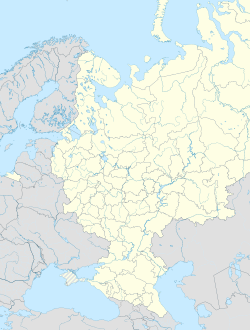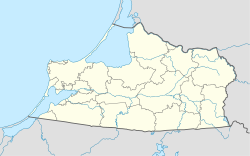Pobeda (Kaliningrad)
| settlement
Pobeda / Arnsberg,
also: Struwe Победа
|
||||||||||||||||||||||||||
|
||||||||||||||||||||||||||
|
||||||||||||||||||||||||||
Pobeda ( Russian Победа , German Arnsberg, Kreis Preußisch Eylau and Struwe ) is the common name of two originally independent places in the Russian Oblast Kaliningrad ( Koenigsberg area (Prussia) ). Pobeda belongs to the Niwenskoje selskoje posselenije (rural municipality Niwenskoje (Wittenberg) ) in the Bagrationovsk district ( Prussian Eylau district ).
Geographical location
Pobeda is located northwest of the Rajon capital and former district town of Bagrationowsk (Prussian Eylau) on a side road that connects Niwenskoje (Wittenberg) on the Russian trunk road A 195 (former German Reichsstraße 128 ) with Slavskoje (Kreuzburg) and Pogranitschnoje (Hussehnen) in the Russian-Polish border area . Until 1945 Gussewo (Groß Park , no longer exists today) was the next station on the line of the Kleinbahn Tharau – Kreuzburg , which is no longer operated.
history
Until 1945
Pobeda / Arnsberg
The village formerly known as Arnsberg is located 20 kilometers from Bagrationowsk (Prussian Eylau) - directly on the road from Niwenskoje (Wittenberg) to Slavskoje (Kreuzburg) . From 1874 to 1945 Arnsberg was the seat and eponymous place for the newly established Arnsberg district , which initially included the rural communities of Kavern (Russian: Perwomaisjoje, no longer existent), Neu Park (Maikowo, no longer existent) and Packerau (Maiskoje) as well as the manor district Arnsberg belonged. In 1910, 287 inhabitants were registered in the village with a large estate and a brick factory.
On September 30, 1928, the rural community Neu Park and the Arnsberg manor district merged to form the new rural community Arnsberg. The number of inhabitants rose to 1933 on 268 and was in 1939 already 291. In 1945 - the District Arnsberg that time were still the three municipalities Arnsberg, Lavern and Packereu - came Arnsberg with his two outworks Struwe (today also: Pobeda) and Heyde ( Today in Russian: Kalmykowo) as a result of the Second World War with northern East Prussia to the Soviet Union and in 1950 received the Russian name Pobeda (German meaning = "victory").
Pobeda / Struwe
The former Arnsberger Vorwerk called Struwe is also located 20 kilometers northwest of Bagrationowsk (Prussian Eylau) . A spur road branches off north of Sadowoje in a westerly direction from the connecting road Niwenskoje (Wittenberg) - Slavskoje (Kreuzburg) . Historically, the place is linked to the mother community of Arnsberg.
When the place was taken over by the Soviet Union in 1950, Struwe was given the same Russian name as the mother community in Arnsberg: Pobeda .
Since 1946
The two formerly independent localities Arnsberg and Struwe were united in 1950 under the Russian name Pobeda. Pobeda was incorporated into the Wladimirowski soviet (Dorfsovjet Wladimirowo (Tharau) ) until 2009 . Since then, due to a structural and administrative reform, the place has been declared a “settlement” (Russian: possjolok) within the Niwenskoje selskoje posselenije (rural community Niwenskoje (Wittenberg) ) in Bagrationovsk district .
church
Before 1945, the population of the two villages Arnsberg and Struwe was predominantly of Protestant denomination. Both villages were in the parish of Kreuzburg (today Russian: Slawskoje). It belonged to the church district Preußisch Eylau (Bagrationowsk) in the church province of East Prussia of the Church of the Old Prussian Union . The last German clergy were pastors Friedrich Schumacher and Arno Stritzel .
During the time of the Soviet Union , church life was suppressed. In the 1990s, new Protestant congregations emerged in the Kaliningrad Oblast . The closest to Pobeda is the village parish in Gwardeiskoje (Mühlhausen) . It is a subsidiary of the Church of the Resurrection in Kaliningrad (Königsberg) and belongs to the Kaliningrad provost of the Evangelical Lutheran Church of European Russia (ELKER).
Individual evidence
- ↑ Itogi Vserossijskoj perepisi naselenija 2010 goda. Kaliningradskaya oblastʹ. (Results of the 2010 all-Russian census. Kaliningrad Oblast.) Volume 1 , Table 4 (Download from the website of the Kaliningrad Oblast Territorial Organ of the Federal Service for State Statistics of the Russian Federation)
- ^ Location information - picture archive East Prussia: Arnsberg
- ^ Rolf Jehke, Arnsberg District
- ↑ Uli Schubert, community directory, Prussian Eylau district
- ^ Michael Rademacher: German administrative history from the unification of the empire in 1871 to the reunification in 1990. District Preussisch Eylau (Russian Bagrationowsk). (Online material for the dissertation, Osnabrück 2006).
- ^ Location information - picture archive East Prussia: Struwe
- ↑ The Указ Президиума Верховного Совета РСФСР от 5 июля 1950 г., №745 / 3, "О переименовании населённых пунктов Калининградской области» (Regulation 745/3 of the Presidium of the Supreme Soviet of the RSFSR "About renaming of places in the Kaliningrad region" from July 5, 1950)
- ↑ According to the Law on the Composition and Territories of Municipal Forms of the Kaliningrad Oblast of June 25th / 1. July 2009, along with Law No. 253 of June 30, 2008, specified by Law No. 370 of July 1, 2009
- ^ Evangelical Lutheran Provosty of Kaliningrad ( Memento of August 29, 2011 in the Internet Archive )

